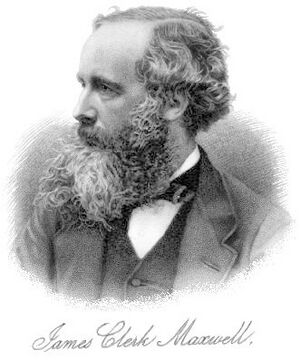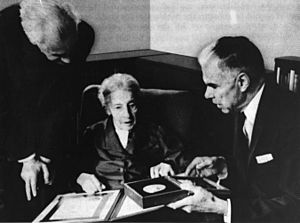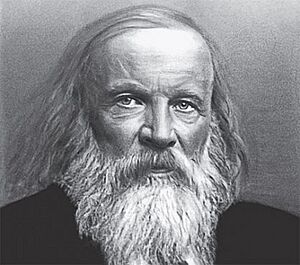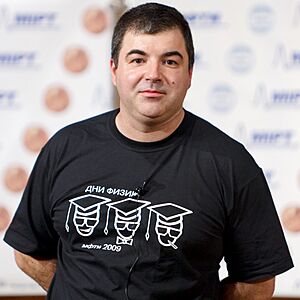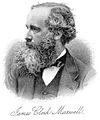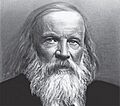List of fellows of the Royal Society M, N, O facts for kids
The Royal Society of London is one of the oldest and most respected science groups in the world. It started way back in 1660! Being a Fellow of the Royal Society means you are a top scientist, engineer, or mathematician who has made amazing discoveries. It's a huge honor, like being in a hall of fame for brilliant minds.
Since it began, thousands of incredible people have become Fellows. This article shares some of the famous names, especially those whose last names start with M, N, or O. The Royal Society keeps a full list of all its members online.
Contents
What is a Fellow?
A Fellow is someone chosen by the Royal Society because they have done something truly special in science. They might have discovered new things, invented important technologies, or helped us understand the world better. It's a way to celebrate and recognize their hard work and brilliant ideas.
Famous Fellows (M, N, O)
Many incredible scientists and thinkers have been Fellows of the Royal Society. Here are a few examples from the M, N, O section of the list:
Scientists Who Changed the World
Isaac Newton
Isaac Newton (elected 1672) was an English scientist who made huge discoveries. He figured out the laws of motion and gravity. He also invented calculus, a type of math used in many sciences. Newton was even the President of the Royal Society for many years!
James Clerk Maxwell
James Clerk Maxwell (elected 1861) was a Scottish physicist. He is famous for his work on electricity and magnetism. He showed that light is actually an electromagnetic wave. His ideas helped pave the way for radio, television, and many other technologies we use today.
Lise Meitner
Lise Meitner (elected as a Foreign Member in 1955) was an Austrian-born physicist. She was a key scientist in the discovery of nuclear fission. This is the process where an atom's nucleus splits, releasing a huge amount of energy. Her work was very important for understanding atomic power.
Dmitri Mendeleev
Dmitri Ivanovich Mendeleeff (elected as a Foreign Member in 1892) was a Russian chemist. He created the first version of the periodic table of elements. This table organizes all the chemical elements in a logical way. It's a fundamental tool for chemists and scientists everywhere.
César Milstein
César Milstein (elected 1975) was an Argentine-British scientist. He won the Nobel Prize in Medicine in 1984. He was recognized for his work on how our bodies make special proteins called antibodies. These antibodies help fight off diseases. His research led to new ways of treating illnesses.
Paul Nurse
Paul Nurse (elected 1989) is a British geneticist and cell biologist. He won the Nobel Prize in Physiology or Medicine in 2001. He discovered key molecules that control how cells grow and divide. This research is vital for understanding diseases like cancer. He also served as President of the Royal Society.
Konstantin Novoselov
Konstantin Sergeevich Novoselov (elected 2011) is a Russian-British physicist. He won the Nobel Prize in Physics in 2010 for his work on graphene. Graphene is an amazing material, only one atom thick, with incredible strength and electrical properties. It has many potential uses in future technology.
Other Notable Fellows
Many other important people from various fields have been part of the Royal Society. These include:
- Otto Maass (elected 1940), a professor of Physical Chemistry.
- Thomas Babington Macaulay (elected 1849), a famous historian and politician.
- Charles Macintosh (elected 1824), known for inventing waterproof fabric.
- Patrick Manson (elected 1900), a doctor who studied tropical diseases.
- Gideon Algernon Mantell (elected 1825), a geologist who studied dinosaurs.
- Thomas Robert Malthus (elected 1818), an economist who studied population growth.
- Patrick Alfred Caldwell Moore (elected 2001), a famous astronomer and TV presenter.
- Richard Owen (elected 1834), a biologist who coined the word "dinosaur."
- Hans Christian Ørsted (elected 1821), a Danish scientist who discovered that electric currents create magnetic fields.
- Georg Simon Ohm (elected 1842), a German physicist known for Ohm's Law, which describes how electricity flows.
These individuals, and many others on the long list, have all contributed to making our world a better and more understandable place through their scientific efforts.
Images for kids
 | Georgia Louise Harris Brown |
 | Julian Abele |
 | Norma Merrick Sklarek |
 | William Sidney Pittman |


